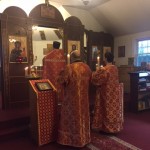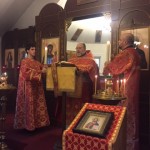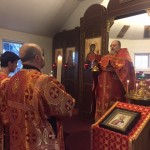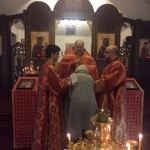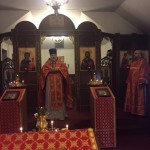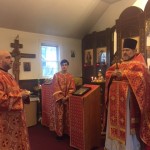On December 16, on the 29th Sunday after Pentecost, we had a beautiful celebration at St. George Church. Liturgical service was led by our Rector, Archpriest Igor Tarasov. After the Gospel lesson of the Divine Liturgy he preached the following homily in English:
“Our Gospel lesson for today is very similar to another reading we usually have earlier in the year. It is about a conversation between our Lord Jesus Christ and some the man whom today’s reading calls the “young ruler”. That conversation had a very important subject: eternal life and how to inherit it (Lk. 18, 18-27).”
”Our Lord Jesus Christ offers the young ruler a certain way to inherit eternal life: to keep the Commandments. It is by itself enough to enter the Kingdom of God. But the young man is either so righteous that he have kept all the Commandments from his youth, as he says (Lk. 18, 21), or he is too proud to say that. Hearing that answer Jesus suggests that the young man should sell all his possessions and then follow Him (Lk. 18, 22). In this way the young man became challenged by the Lord not only to observe the Law of Moses, but to start doing something which belongs to the New Testament. The new teaching of Christ means to sacrifice something in your life to acquire something more important, to get into the life of Christ. It is also mean to be ready to follow Christ. It is different from the Old Testament teaching which commanded only to obey the law. In Christ we need also to act sacrificing and following the Lord.”
“St. John Chrysostom interpreting that Gospel reading teaches that the Lord offered the young man such an advice to sell his possessions because He loved that man (see Mk. 10, 21). Thus Jesus named these conditions for his particular need. He knew that this young man needed to free himself from his wealth in order to become saved. Very often God allows in our life to happen certain things needed for us, things which are made just for us. We often do not even notice that, but everything in our life is providential, is a result of God’s care for each one of us. We may not like certain problems, sorrows or inflictions we have from time to time, but God allows them to help us to become better. In this case our Lord proposed the young man to renounce material wealth because that wealth meant too much for him. We learn about it when we read that the young man became very sorrowful to hear what Jesus told him (Lk. 18, 23). And the young man left Jesus and probably never came back.”
“Sometimes we have somebody coming to the church, talking to a priest. After that people leave and also never come back. Some may complain that a priest is too strict or demanding, so new people are not happy with him and we lose them for the parish. Usually, it’s not the case. The reason they leave is that they are not willing to comply with the church rules and they are not ready to give up certain things they are attached to. And this is very typical of us to be attached to certain things and to fail to serve God and other people because of that. It is not necessarily great wealth we are attached to. It may be some small thing, some habit or some person. It may be our way of life which cannot allow Jesus to be part of it.”
“If our attachment is so serious to block our salvation, we need to renounce it. We need to unload ourselves, free ourselves from that burden. In today’s Gospel the Lord says a famous phrase: “It is easier for a camel to go through a needle’s eye, than for a rich man to enter into the Kingdom of God” (Lk. 18, 25). Some interpreters of the Scripture say that Jesus was talking about the certain gate in Jerusalem which was called The Needle’s Eye because it was very small. A camel could pass through that gate only if it was unloaded and only in a kneeling position. If that so, we should also, like those camels passing through that gate, unload ourselves from everything that makes our entering God’s Kingdom impossible. Our lives and our souls need to be unloaded, to let go our passions, our attachments of this sinful life. Those have to be laid aside.”
“If we renounce those bad attachments we may follow the Lord and inherit His Kingdom. But let us remember that in doing so, we need God’s help. For it is said that “the things which are impossible with men are possible with God” (Lk. 18, 27). Without God’s help it is impossible to lay aside our bad inclinations and give up certain bad things we like. But with the help of God it is possible. Therefore, dear brothers and sisters, let us ask our Lord for help, for His divine grace, so we may really let go our earthly attachments and easily come through the narrow path of Christian life to the Kingdom of God.”
During preparation for Holy Communion the choir prayerfully performed the magnification to the Holy Apostle Andrew whose memory was celebrated last week.
After the dismissal of the Liturgy the Rector preached a short sermon in Russian conveying the ideas of his English homily. He also congratulated our Sacristan and altar server Andrew Malyshev on the occasion of his past name day wishing him God’s blessings, a warm intercession of Holy Apostle Andrew, great success in his service to the Church and many happy years. A traditional Polychronion (“Mnogaia leta!”) was proclaimed.
The Rector also called the parishioners to attend celebration of the Patronal feast of St. Nicholas at our Patriarchal Cathedral in New York on coming Wednesday.

